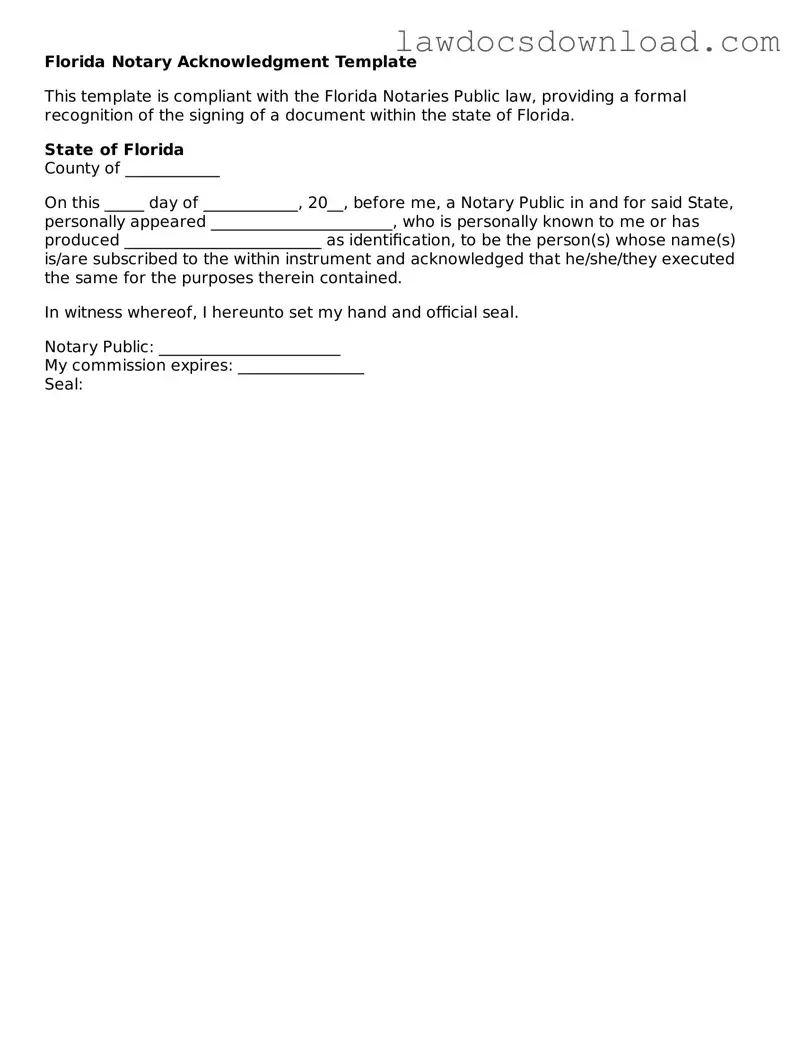The Jurat form is closely related to the Florida Notary Acknowledgement form in its purpose to certify the authenticity of signed documents. While the Notary Acknowledgement confirms that the signer acknowledges they are signing the document of their free will, the Jurat also requires the signer to swear or affirm that the content of the document is true. Both forms necessitate a notarial officer's presence but are used under different circumstances depending on the document's legal requirements.
The Affidavit is another document similar to the Florida Notary Acknowledgement form, primarily because both involve a swearing process before a notary or authorized officer. An affidavit is a written statement made under oath, asserting that the information contained within is true. Like the Notary Acknowledgement, the affidavit's validity often depends on being notarized, ensuring the signer's identity and their understanding of the document's contents.
A Power of Attorney (POA) shares commonalities with the Florida Notary Acknowledgement form by involving notarization to confirm the identity of the parties involved and their understanding and agreement to the document's terms. A POA document allows one person to grant another person the authority to make legal decisions on their behalf. The notary's acknowledgment acts to verify the signature of the principal (the person granting the power) and to certify their capacity to make such a decision.
Declaration forms bear similarity to the Florida Notary Acknowledgement form in that both are used to formally declare statements or intentions before a notary or authorized officer. Declarations, much like acknowledgments, require the signer to affirm the truthfulness and accuracy of the statement or information provided, with the notary certifying the process. These documents, however, do not necessarily need to involve legal matters, and their use can be more versatile.
Mortgage documents often require a Notary Acknowledgement form to ensure that the signing of the mortgage is duly recognized and authenticated. The acknowledgment within a mortgage process confirms that the borrower is aware of and agrees to the terms of the mortgage. This notarization helps protect the interests of all parties involved by verifying the document's execution is based on the signer's free will.
Loan Documents, similar to mortgage documents, frequently incorporate the Florida Notary Acknowledgement to affirm the signer's understanding and agreement to the terms of the loan. This form is integral in the process as it provides a layer of verification and legal standing, ensuring that the loan agreement is executed properly and willingly by the borrower, thereby reducing the potential for disputes.
The Bill of Sale is another document where the Florida Notary Acknowledgement form is often utilized, particularly to confirm the transfer of ownership for valuable assets like vehicles or property. The notary's acknowledgment in this context verifies the identity of the seller and the authenticity of their signature, adding a level of security and trust to the transaction by certifying that the seller indeed consents to the terms and transfer of ownership.
Title Transfers for vehicles or property often necessitate a Notary Acknowledgement to legitimize the change in ownership. This form is crucial in ensuring that all parties acknowledge the transfer freely and willingly. The notary's role in this instance is to witness the signatures and confirm the identities of the parties, similar to the function it serves in many legal documents where the authenticity of agreement is paramount.
A Last Will and Testament document often includes a Notary Acknowledgement to confirm the authenticity and voluntary nature of the will's execution. The notary ensures that the individual creating the will (the testator) signs in their presence, verifying their identity and their intent to sign the document of their own free will, thereby reinforcing the document's validity and enforceability.
The Release of Lien documents, commonly paired with a Notary Acknowledgement, serve to officially remove a lienholder's interest from a title, indicating that a debt has been satisfied. Similar to other documents requiring acknowledgments, the notarization process here verifies the identity of the signer and ensures that the release is executed willingly and knowingly, fulfilling legal stipulations necessary for the removal of the lien.

